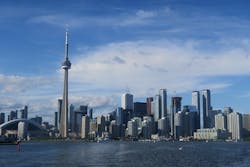Resistance to Toronto’s ‘smart city’ reveals pitfalls of such ambitious projects
By Peter Fabris, Contributing Editor
Two years ago, a plan to create a smart city project along Toronto’s waterfront was unveiled with great fanfare.
Since then, the proposal, spearheaded by Sidewalk Labs, a subsidiary of Alphabet (Google’s parent company) has prompted extensive public criticism and a lawsuit by the Canadian Civil Liberties Association over data privacy and misuse concerns. The ambitious project was conceived as a showcase for the latest smart city technologies.
The project is to be centered on sustainable and safe transportation systems, and efficient and affordable housing. Technology such as “adaptive traffic lights” would prioritize cyclists and pedestrians and study the possibility of autonomous transit options. Innovative building materials and new occupancy models, like “co-housing”, would offer green, reasonably-priced housing.
With sensors tracking people and vehicles sprinkled throughout the development, privacy rights advocates are concerned that the data could be used for surveillance and discourage people to exercise free speech rights. It didn’t help that at public hearings Sidewalk Labs seemed unable to spell out where this data would be stored and how it would be used.
The company also presented a greatly expanded scope of the proposal from the original 12 acres to a 190-acre area at a public meeting, perhaps misreading the intent of the agreement with the city. These issues have caused delays to the project, but Waterfront Toronto, the city group overseeing it, recently voted to go forward with the 12-acre development.
Other smart city projects around the globe, including in South Korea and India, have been also been plagued by delays and controversies. These challenges indicate that making cities smarter will not be easy.
